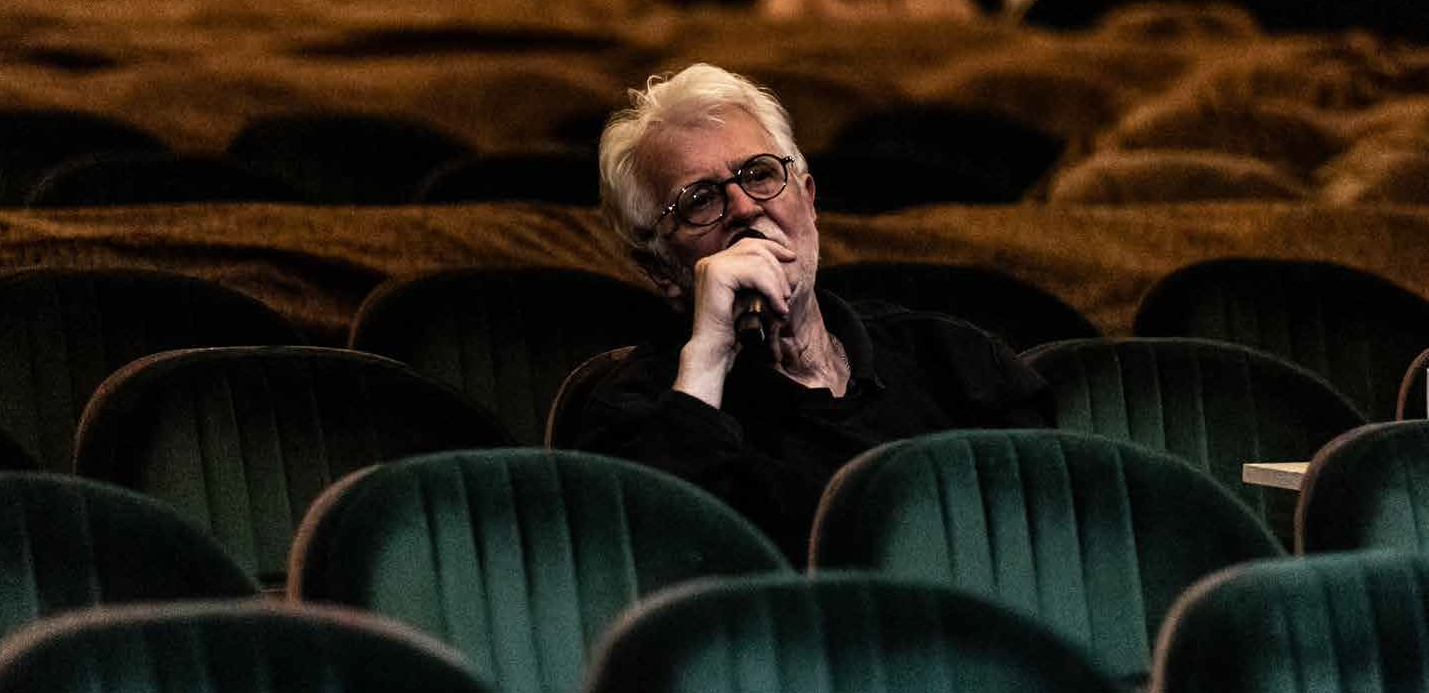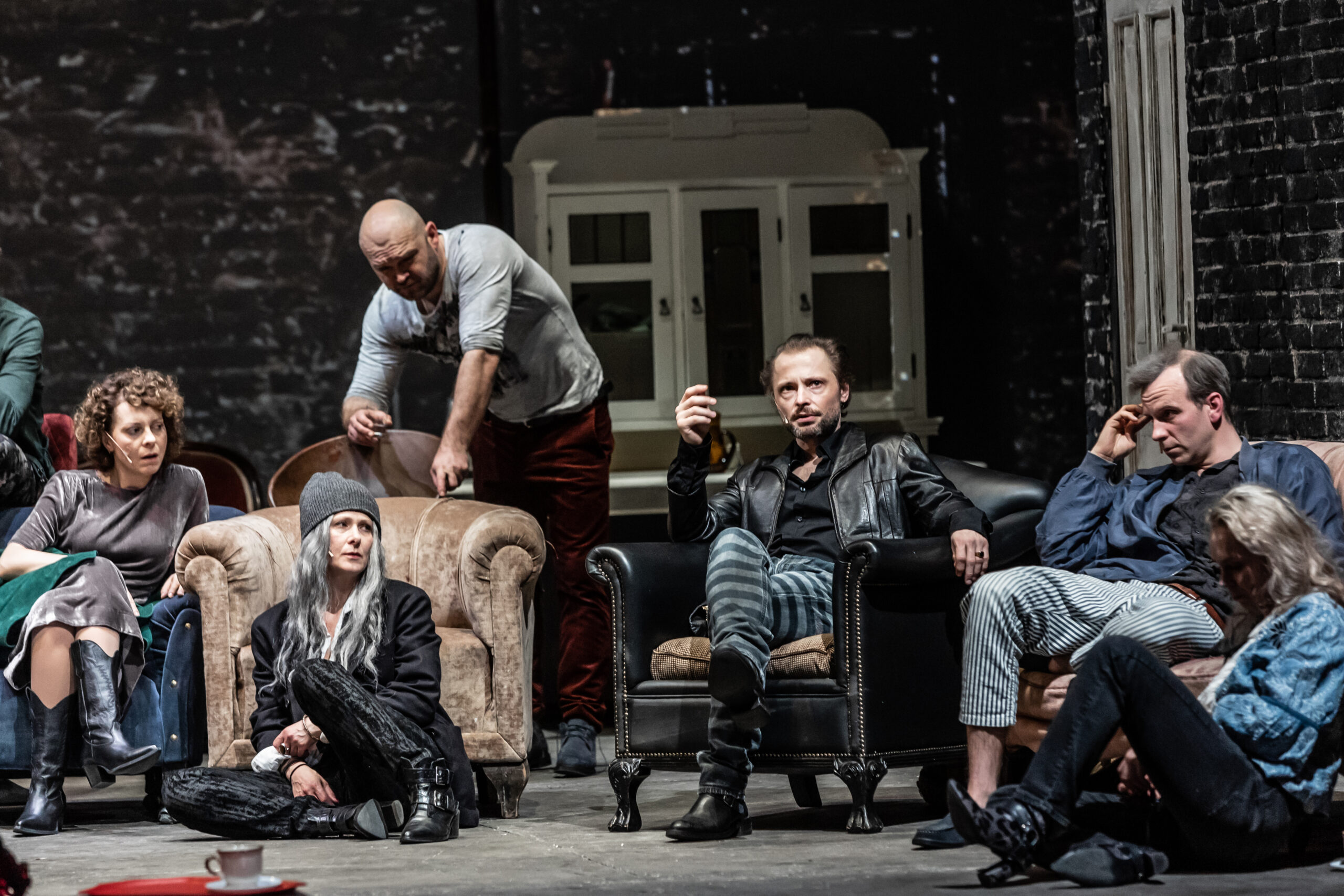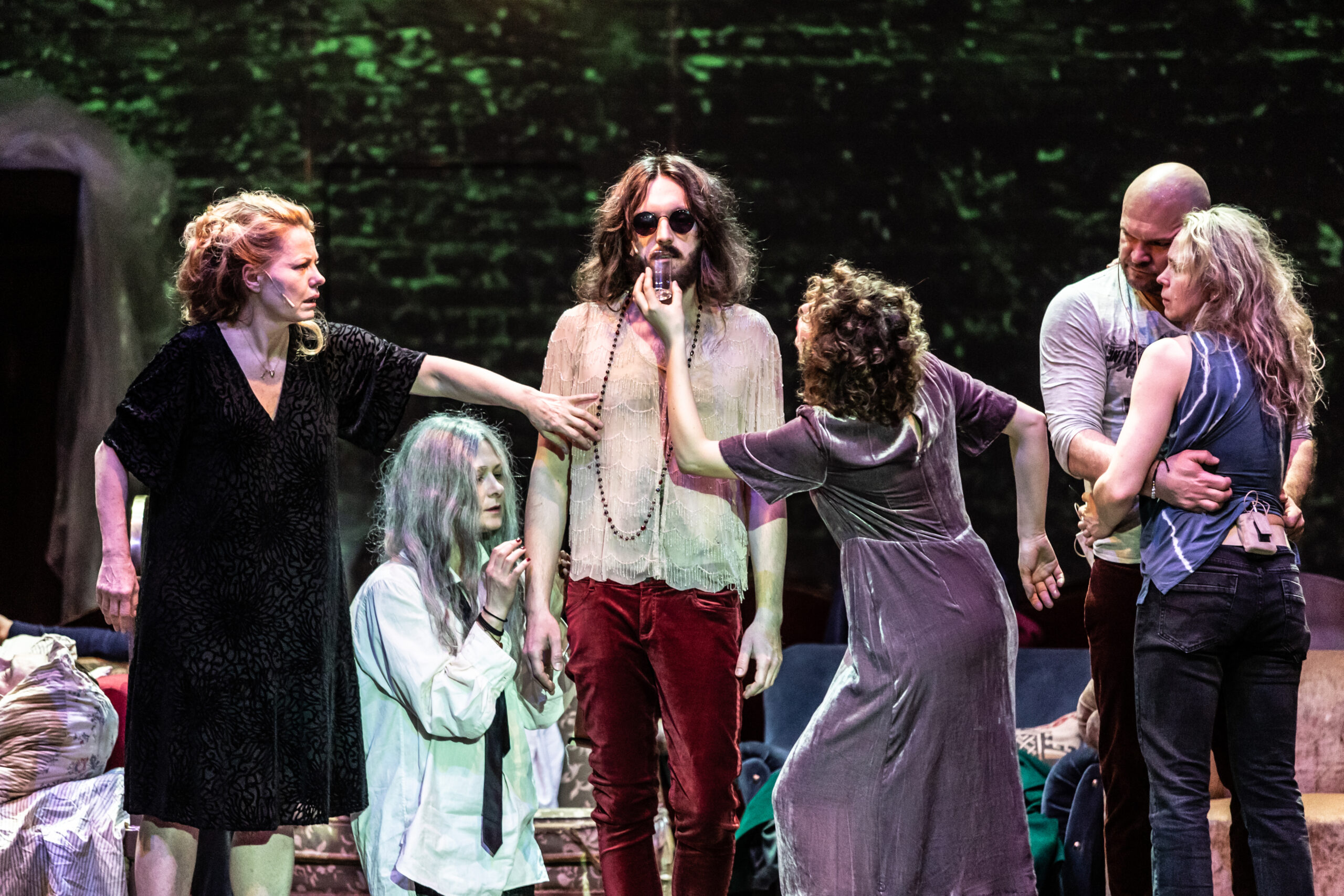
Imagine occupies a unique place in Krystian Lupa’s artistic oeuvre. It is the most radical of the director’s productions since the first version of Miasto snu based on Kubin’s novel, Zaratustra, drawing upon Nietzsche’s philosophical treatise, and Poczekalnia 2.0. With his six-hour stage essay, Lupa returns to the origins of his visionary theatre, which acts as a laboratory for new spirituality. After a series of productions exploring political oppression, the threat of totalitarianism and war trauma, such as Proces based on Kafka’s novel, Capri – wyspa uciekinierów according to Curzio Malaparte’s prose and Austerlitz (according to Sebald) produced in Vilnius, the director comes to explore counterculture of the 1960s to pose the fundamental question: ‘unde malum’ – ‘where does evil come from?’.
What triggers the thought process behind the show is the eponymous song by John Lennon dated 1971, a pacifist manifesto for the left, and the praise of atheism and communism for the conservative right. Half a century later the dream of the brotherly world without states, religion and property, the main causes of violence, greed and hunger according to the songwriter, remains as utopian as it was in the Cold War era. What makes human beings reproduce old patterns based on violence and conquest? Why does the growth of knowledge and technology not go hand in hand with the progress of spirituality and ethics? What went wrong with the flower children revolution, which wanted to bring peace and tolerance to the world?

These questions have been maturing in Lupa for years. He spoke about the Imagine generation, which he identifies himself with, in 2016 during the conference Kulturo-futuro! Poza granice wyobraźni in Wrocław, dedicated to visions of the future. He contrasted the people of war, who look for the enemy in the Other, with the people of empathy, who seek to understand the Other. “World War II left us shocked […]. For the first time ever, we felt the threat of self-annihilation, the fact that we could totally derail the sense of existence for our species on this planet. That threat informed post-war generations, which I think of as the bright ones and which are best expressed by John Lennon’s song Imagine: imagine a world without God, without borders, without hate, without wars, without massacres and without the incessant and hopeless war of being right. The war of being right that humanity is fighting is paranoid and is due to the fact that we do not have a shred of will or desire to understand each other, to see a human being in the other,“ said the director.
Lennon’s faith in the transformation of the human kind proved illusory. The 21st century saw the return of the people of war, as vividly shown by the Russians’ invading Ukraine two months before the premiere of Imagine. Produced in the shadow of the new conflict, not only has the show become the director’s personal reckoning with the dream of the post-war generation, but is also an attempt to answer the question of whether there is still space for another Imagine in today’s world.
In order to answer this question, Lupa stages a Kantorian spectre séance, where pop culture icons, intellectuals and artists of the 1960s meet up, including the philosopher Michel Foucault (Michał Lacheta), essayist Susan Sontag (Anna Ilczuk), singers Janis Joplin (Karolina Adamczyk) and Patti Smith (Marta Zięba) and the LSD advocate Timothy Leary (Julian Świeżewski). They come to the wake of John Lennon (murdered in 1980) organized by the spectre of Antonin Artaud, the French film director, a rebel and a critic of bourgeois society who died in 1948 (a double role of Grzegorz Artman and Andrzej Kłak). It is Artaud, who paid for his artistic radicalism with mental illness and alienation, asks the attending counterculture figures the central question of the play: why have you fu**ked up the dream of the world without borders, religions and wars?
The answer, in a sense, is the parody of a religious ritual played out on stage, in which the resurrected Lennon is hailed as the new Christ and the worshippers take the holy communion in the form of a drug and then indulge in an orgy. Artaud commits suicide as a protest against the hypocrisy of the former rebels or perhaps out of helplessness.

The second part of the performance takes the form of Artaud’s inner spiritual journey to the sources of contemporary fears. Together with the creator of ‘theatre of cruelty’, we wander through a post-apocalyptic world, which brings to mind the images of Ukrainian cities razed to the ground. Together with him, we end up in a border zona, where refugees are camped out – those from Europe rather than North Africa. We witness a scene of self-immolation, alluding to the death of Piotr Szczęsny, ‘an ordinary person’ who set himself on fire on plac Defilad in Warsaw in a protest against the Law and Justice government in Poland.
In this realm beyond time and space, Antonin Artaud undergoes a Jungian transformation, confronts his Shadow, meets beings from outer space, who cannot comprehend human civilization, based on egoism and violence, and finally discovers the female element of Anima in himself, and, as Antonina, returns to Earth to save the world again, as if enacting some Christological myth. The journey ends with a terrifying monologue delivered by Piotr Skiba, playing the insane old Artaud, who bangs his drum in fear of the god of war who thirsts for human blood.
Lupa answers the main question of the show in a complex fashion: on the one hand, he accuses the counterculture of naivety and presents its strategy in a distorted mirror; on the other, he draws a portrait of the rebellious artist, entangled in his own contradictions, trying to build a new community, which is being torn apart from within by his own egoism. Neither the rebellion nor art can save the world. Unless we confront our own Shadow, find the enemy within ourselves and give up our monopoly on being right, the man of war will triumph.“ This is what Krystian Lupa seems to be saying with his play.
Through the bitterness of defeat shines the belief that a new Imagine is possible after all…
Roman Pawłowski
Theatre, literary, television and film critic as well as a columnist



